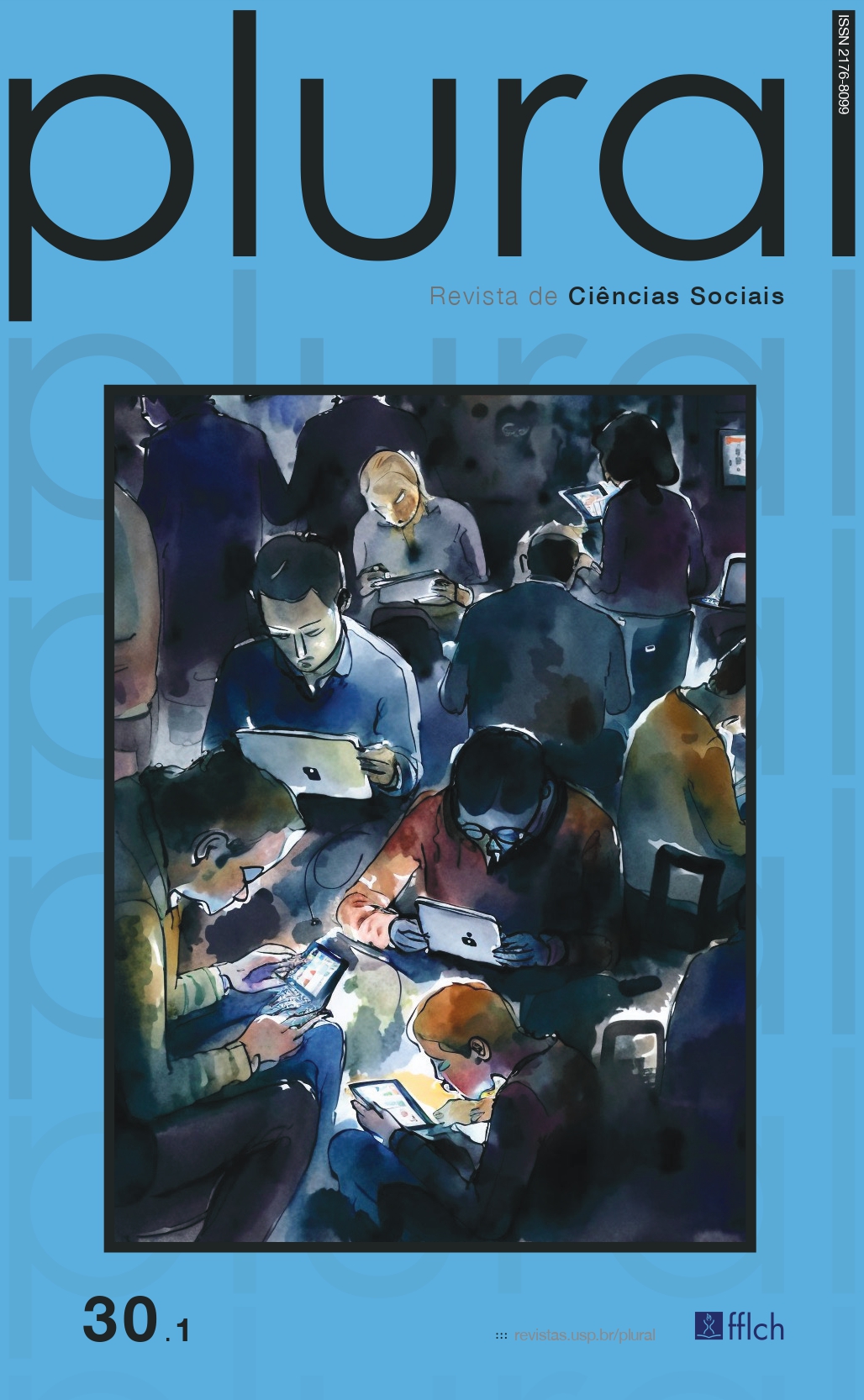A Sociologia Digital na era do big data: apontamentos preliminares e problemáticas teórico-metodológicas na pesquisa sociológica
DOI:
https://doi.org/10.11606/issn.2176-8099.pcso.2023.205611Palavras-chave:
Sociologia digital, Big Data, Método sociológico, Ciência de Dados, Tecnologias informacionaisResumo
Este artigo estabelece as primeiras problemáticas de uma pesquisa em andamento que articula big data e Sociologia Digital no Brasil. Explora-se o fenômeno do big data como objeto de estudo e instrumento técnico de pesquisa em Sociologia, situando-o em uma agenda de pesquisa em Sociologia Digital. Constata-se que sua apreensão e compreensão sociológica acontecem em consonância com ampliação e institucionalização da Sociologia Digital no Brasil e no mundo. O big data é entendido como um artefato sociocultural resultante do trabalho humano, mas de difícil apreensão a partir dos métodos tradicionais de análise sociológica. O objeto em questão é localizado no seio das disputas no campo científico entre as Humanidades e áreas da Tecnologia Informacional, como a Ciência de Dados. A Sociologia Digital, ao tomar o big data como um objeto de investigação e recurso técnico para análises, contribui para que novas abordagens e teorias possam ser formuladas a fim de se pensar as implicações do digital na sociedade e nas Ciências Sociais.
Downloads
Referências
ABBOTT, Andrew. (2000). Reflections on the Future of Sociology. Contemporary Sociology, v. 29, n. 2, pp. 296.
AGARWAL, Apoorv. et al. (2015). Sentiment Analysis of Twitter Data. In: Workshop on Language in Social Media (LSM 2011), 2011, Portland, Oregon. Proceedings... Portland, Oregon: Association for Computational Linguistics, 2011. p. 30–38. http:// dl.acm.org/citation.cfm?id=2021109.2021114 (Acesso em 08/01/2023).
BEER, David.; BURROWS, Roger. (2013). Popular Culture, Digital Archives and the New Social Life of Data. Theory, Culture & Society, V. 30, p. 47-71. https://doi. org/10.1177/0263276413476542.
BERGSTRÖM, Marie (2018). De quoi l’écart d’âge est-il le nombre ? L’apport des big data à l’étude de la différence d’âge au sein des couples. Revue française de sociologie, vol. 59, no. 3, pp. 395-422.
BOLAÑO, C. R. S., & VIEIRA, E. S. (2015a). The Political Economy of the Internet: Social Networking Sites and a Reply to Fuchs. Television & New Media, V. 16, n. 1, p. 52-61. https://doi.org/10.1177/1527476414527137.
BOLAÑO, C. R. S., & VIEIRA, E. S. (2015b). Digitalisation and Labour: A Rejoinder to Christian Fuchs. Triple C, V.13, no 1, p. 79-83. https://doi.org/10.31269/triplec. v13i1.666.
CASTELLS, Manuel (2005). A Sociedade em Rede. Vol. 1, 4a ed. São Paulo: Paz e Terra.
COINTET, Jean-Philippe; PARASIE, Sylvain (2018). Ce que le big data fait à l’analyse sociologique des textes. Un panorama critique des recherches contemporaines. Revue française de sociologie, vol. 59, noo 3, pp. 533-557.
COURMONT, Antoine (2018). Plateforme, big data et recomposition du gouvernement urbain. Les effets de Waze sur les politiques de régulation du trafic. Revue française de sociologie, vol. 59, no. 3, pp. 423-449.
DANTAS, Marcos (2003). Informação e trabalho no capitalismo contemporâneo. Lua Nova, no 60.
FUCHS, Christian. (2015). Against Divisiveness: Digital Workers of the World Unite! A Rejoinder to César Bolaño and Eloy Vieira. Television & New Media, V. 16, n. 1, p. 62-71. https://doi.org/10.1177/1527476414528053.
HAYASHI CHIKIO. (1998). WHAT IS DATA SCIENCE? FUNDAMENTAL CONCEPTS AND A HEURISTIC EXAMPLE DANS C. HAYASHI et al, Data Science, Classification, and Related Methods. Studies in Classification, Data Analysis, and Knowledge Organization, Springer Japan, p. 40-51.
HORST, Heather, A.; MILLER, Daniel. (2012). Digital Anthropology. [S.l.]: Bloomsbury Academic.
JORDAN, Tim. (2014). Internet, Society and Culture: Communicative Practices Before and After the Internet. Reprint edition ed. [S.l.]: Bloomsbury Academic.
KOTRAS, Baptiste (2018). Le tout plutôt que la partie. Big data et pluralité des mesures de l’opinion sur le web. Revue française de sociologie, vol. 59, no. 3, pp. 451-474.
LAZER, David. et al. (2009) Computational Social Science. Science, v. 323. https://www.science.org/doi/10.1126/science.1167742.
LÉVY, Pierre (1999). Cibercultura. Trad. Carlos Irineu da Costa. São Paulo: Ed. 34. LUPTON, Deborah (2015). Digital Sociology. [S.l.], Routledge.
LYON, David. (2018). The culture of surveillance: watching as a way of life. Cambridge: Polity Press.
MARTINS, José de Souza (2013). O artesanato intelectual na sociologia. Revista Brasileira de Sociologia. V. 1, n. 2.
MCFARLAND, Daniel; LEWIS, Kevin; GOLDBERG, Amir (2016). Sociology in the Era of Big Data: the ascent of Forensic Social Science. The American Sociologist, n. 47, p. 12-35. https://link.springer.com/article/10.1007/s12108-015-9291-8 (acesso em 08/01/2023).
MICHEL JEAN-BAPTISTE., SHEN, Yuan Kui, PRESSER AIDEN Aviva. et al. (2010). Quantitative Analysis of Culture Using Millions of Digitized Books, Science, 331, 6014, p. 176-182. https://www.science.org/doi/10.1126/science.1199644 (acesso em 08/01/2023).
MISKOLCI, Richard. (2016), Sociologia digital: notas sobre pesquisa na era da conectividade. Contemporânea - Revista de Sociologia da UFSCar, v. 6, pp. 275-297.
MISKOLCI, Richard; BALIEIRO, Fernando de F. (2018). Sociologia Digital: balanço provisório e desafios. Revista Brasileira de Sociologia. V. 6, no 12, jan-abr.
NASCIMENTO, Leonardo F. (2016). A sociologia digital: um desafio para o século XXI. Sociologias, v. 18, p. 216-241.
PRIOR, Nick; ORTON-JOHNSON, Kate. (2013). Digital Sociology: Critical Perspectives. [S.l.]: Palgrave Macmillan.
RHUKUZAGE, Serge K. (2020) Sociologia digital ou sociologia do digital? Ver. Abordagens. João Pessoa, V.2, no 1, jan-jun.
ROMARIZ, Harlon (2020). O papel da Sociologia na era do big data. Blog do IFCH da UFRGS, novembro. Acesso em: 08/08/2022. Disponível em: https://www.ufrgs. br/blogdoifch/o-papel-da-sociologia-na-era-do-big-data/ (acesso em 08/01/2023).
SEVERO, Marta; LAMARCHE-PERRIN, Robin (2018). L’analyse des opinions politiques sur Twitter. Défis et opportunités d’une approche multi-échelle. Revue française de sociologie, vol. 59, no. 3, pp. 507-532.
TUBARO, Paola; CASILLI, Antonio A. (2017). Enjeux sociaux des Big Data. Mokrane Bouzeghoub, Rémy Mosseri. Les Big Data à découvert, CNRS Editions, pp. 292-293.
TUBARO, Paola ; BASTIN, Gilles (2018). Le moment big data des sciences sociales. Revue française de sociologie, Presses de Sciences Po / Centre National de la Recherche Scientifique, Big data, sociétés et sciences sociales, 59 (3), pp.375-394.
TUBARO, Paola; CASILLI, Antonio A.; COVILLE, Marion (2020). The trainer, the verifier, the imitator: Three ways in which human platform workers support artificial intelligence. Big Data & Society, 7 (1), SAGE.
WITTE, James. C. (2012). A Ciência Social digitalizada: avanços, oportunidades e desafios. Sociologias, v. 14, n. 31. Disponível em: http://seer.ufrgs.br/index.php/ sociologias/article/view/34927 Acesso em: 10/08/2022.
Publicado
Edição
Seção
Licença
Copyright (c) 2023 Política de direitos compartilhados

Este trabalho está licenciado sob uma licença Creative Commons Attribution-NonCommercial-ShareAlike 4.0 International License.
Ao submeter seu trabalho à Plural, o autor concorda que: o envio de originais à revista implica autorização para publicação e divulgação, ficando acordado que não serão pagos direitos autorais de nenhuma espécie. Uma vez publicados os textos, a Plural se reserva todos os direitos autorais, inclusive os de tradução, permitindo sua posterior reprodução como transcrição e com devida citação de fonte. O conteúdo do periódico será disponibilizado com licença livre, Creative Commons - Atribuição NãoComercial- CompartilhaIgual –, o que quer dizer que os artigos podem ser adaptados, copiados e distribuídos, desde que o autor seja citado, que não se faça uso comercial da obra em questão e que sejam distribuídos sob a mesma licença (ver: http://www.creativecommons.org.br/).







